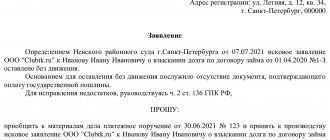Instead of a decision on the case, the party may face the court leaving the application without consideration. That is, the court will issue an act that will not resolve the dispute. But the civil case will end. However, the undoubted advantage of this situation is that the parties retain the right to go to court with the same claim. Unlike situations where the case is terminated.
What to do if the court left the application without consideration? It is necessary to carefully study the grounds. There is an opportunity to cancel leaving an application without consideration. And perhaps this action will save time before the court makes a decision.
Download:
Application for cancellation of determination without consideration
When the court leaves the application without consideration
The grounds for leaving a statement are situations when:
- The plaintiff, before filing the claim, did not apply for a pre-trial dispute resolution procedure, which is mandatory. That is, such an order is established by law.
- a claim (application) was filed by a citizen declared legally incompetent. In addition to filing an application for recognition of legal capacity, for the restoration of a missed procedural deadline in cases of recognition of incompetence;
- the same case (between the same parties, on the same subject and basis) is already being considered by a court of general jurisdiction, an arbitration court;
- the application was submitted and signed by an unauthorized person (representative);
- the parties have previously agreed to consider the dispute by an arbitration court (either party can declare this and this should be the first statement in court)
- during the consideration of the case (but before making a decision), the participants entered into an agreement to apply to an arbitration court
- both parties failed to appear in court on the second summons. And they did not file an application for the case to be heard in their absence
- The plaintiff on the second summons did not appear in court and did not ask to consider the case in his absence. But the defendant did not demand to consider the case on its merits.
Samples of statements, objections, complaints, petitions in civil cases
Author: Anatoly Antonov, February 17, 2022 at 04:39 pm According to Article 30.1-30.3 of the Code of Administrative Offenses of the Russian Federation, a decision in a case of an administrative offense can be appealed by the persons specified in Articles 25.1 - 25.5.1 of this Code: 1) made by a judge - to a higher court;
2) issued by a collegial body - to the district court at the location of the collegial body; 3) issued by an official - to a higher body, a higher official or to the district court at the place of consideration of the case; 3.1) issued by the official specified in Part 2 of Article 23.79, Part 2 of Article 23.79.1 or Part 2 of Article 23.79.2 of this Code - to a higher body, a higher official, authorized by the relevant regulatory legal act of the President of the Russian Federation, the Government of the Russian Federation Federation or an agreement on the transfer of the exercise of part of the powers to the federal executive body or to the district court at the place of consideration of the case; 4) issued by another body created in accordance with the law of a constituent entity of the Russian Federation - to the district court at the place of consideration of the case. A decision in a case of an administrative offense made by a judge may also be appealed to a higher court by an official authorized in accordance with Article 28.3 of this Code to draw up a protocol on an administrative offense. If a complaint against a decision in a case of an administrative offense has been received by the court and a higher authority, a higher official, the complaint is considered by the court. Based on the results of consideration of the complaint, a decision is made. A decision in a case of an administrative offense related to the implementation of entrepreneurial or other economic activities by a legal entity or a person carrying out entrepreneurial activities without forming a legal entity is appealed to the arbitration court in accordance with arbitration procedural legislation. The decision to refuse to initiate a case on an administrative offense is appealed in accordance with the rules established by this chapter. A complaint against a decision in a case of an administrative offense is submitted to the judge, body, or official who issued the decision on the case and who are obliged to send it with all the materials of the case to the appropriate court, higher body, or higher official within three days from the date of receipt of the complaint. A complaint against a judge’s decision to impose an administrative penalty in the form of administrative arrest or administrative expulsion must be sent to a higher court on the day the complaint is received. A complaint can be filed directly with a court, a higher authority, or a higher official authorized to consider it. If consideration of the complaint does not fall within the competence of the judge or official by whom the decision in the case of an administrative offense is appealed, the complaint is sent for consideration according to jurisdiction within three days. A complaint against a decision in a case of an administrative offense is not subject to state duty. A complaint against a judge’s decision to impose an administrative penalty in the form of administrative suspension of activities must be sent to a higher court on the day the complaint is received. A complaint against a decision in a case of an administrative offense may be filed within ten days from the date of delivery or receipt of a copy of the decision. If the deadline provided for in Part 1 of this article is missed, the specified period, at the request of the person filing the complaint, may be restored by a judge or official authorized to consider the complaint. Complaints against decisions in cases of administrative offenses provided for in Articles 5.1-5.25, 5.45-5.52, 5.56, 5.58, 5.69 of this Code may be filed within five days from the date of delivery or receipt of copies of decisions. A ruling is issued on the rejection of the petition to restore the period for appealing the decision in the case of an administrative offense. Thus, you can appeal against bringing you to administrative responsibility in the magistrate’s court at the location of the traffic police within 10 days after you learned about your fines. Answer
What does leaving an application without consideration mean?
The court, having established the existence of grounds not to consider the claim (application), issues a ruling. He must cite the specific circumstance that caused the issuance of such an act. And why they interfere with making a reasoned and legal decision in the case.
The court's ruling will come into force according to the general rules. Since it prevents further consideration of the case, a private complaint may be filed against it. The participant in the case must decide for himself what will be more profitable for him. Leaving an application without progress does not prevent a repeated application to the court. Therefore, it is often easier to file a new claim. How to come up with a justification for violating the procedure for issuing a ruling to leave without consideration.
Consequences
Article 223 of the Code of Civil Procedure provides that the court, upon establishing these circumstances, must immediately issue a ruling. The document is sent to all interested parties, and the proceedings are terminated.
The citizen’s appeal and attached documents are examined throughout the proceedings. Therefore, the claim can be left without consideration at any stage.
The applicant has several options to solve the problem:
- Appeal the judge's ruling. This requires evidence that the court, when making a determination, had incomplete information or incorrectly assessed the evidence.
- Correct the deficiencies and reapply.
- Give up intentions. Such a decision is fair if the parties have agreed to submit the dispute to arbitration. Persons have changed jurisdiction by agreement and are now obliged to adhere to it.
- Request continuation of consideration of the claim. This option is possible if the citizen has not previously attended 2 meetings, although he was notified of the date and time of their holding. The applicant goes to court again, attaches documents confirming the valid reasons for failure to appear, and asks the government agency to reopen the case.
How to cancel
In addition to a private complaint, a party to the case may file an application to cancel a previously issued ruling. To the same court that sentenced him. And only when it was issued for the following reasons:
- the parties (both) did not appear in court for the second summons and did not file an application for the hearing of the case in their absence
- The plaintiff in the secondary summons did not appear in court, did not ask to consider the case in his absence, and the defendant did not demand to consider the case on its merits.
The applicant must prove that he had valid reasons for not appearing in court. This could be illness, business trip, change of residence, etc. But not only. It is also significant that the applicant could not communicate the existence of such reasons to the court. That is, there were such circumstances that he objectively could not inform the court about the impossibility of appearing at the court hearing. The interested person may appeal the court's decision to refuse to satisfy the petition to cancel leaving the application without consideration.
How to appeal a determination: step-by-step instructions
The petition is submitted in the following order:
- Submit your request in writing. Oral petitions are accepted only during the court hearing - they are recorded in the minutes. In this case they are irrelevant.
- File a petition with the court that issued the disputed document. You or your legal representative – a lawyer – have the right to do this. Also, the determination may be canceled at the initiative of the defendant who missed the hearings without prior notice twice.
- Wait for a new ruling to cancel the disputed one.
- Come to the meeting at the appointed time or submit a request for consideration in absentia.
Lawyer's advice: it's easier to re-file the claim. It must indicate that you have previously filed a similar dispute. In most cases, petitions for annulment are not granted: judges always find arguments in their favor.
Valid reasons for individuals
The determination may be challenged by the plaintiff or defendant by providing evidence of valid reasons for failure to appear at the meeting after a second summons:
- Disease;
- Stay on a business trip;
- Caring for a seriously ill relative or child;
- Late receipt of notification of a meeting: for example, on the day of its holding;
- Death of a close relative;
- Force majeure circumstances: fire, flood, war, etc.
There may be other valid reasons, but the issue of their acceptance is decided individually.
Valid reasons for legal entities
While it is easy for ordinary citizens to confirm good reasons, it is more difficult for organizations.
The following cannot be used as such reasons:
- Lack of a lawyer on staff;
- The need to coordinate the filing of a petition or appeal with a higher authority;
- The applicant's lawyer or lawyer being on vacation, business trip, or on sick leave;
- Reorganization of the enterprise, during which there is a change of management.
The only option for a company whose representative did not appear at the hearing is late notification of the date of the meeting or lack of information about the disputed document.
Contents and sample of the application
The form of applications is not established by law.
To be accepted, the following information must be provided:
- Name and address of the court;
- Full name, addresses of the plaintiff and defendant;
- The name of the previously pending case;
- The grounds on which the decision to dismiss the claim was made;
- Valid reasons, request for cancellation;
- Description of submitted documents.
At the end the applicant signs.
Sample of a private complaint against a court ruling: alt: Private complaint against a court ruling
Sample of a private complaint against a ruling by a magistrate: alt: Private complaint against a ruling by a magistrate
Documentation
The citizen who filed the petition must submit documents confirming valid reasons for missing a meeting twice:
| Base | What you will need |
| Illness of the plaintiff or defendant |
|
| Business trip |
|
| Caring for a seriously ill relative or child. |
|
| Death of a relative | Death certificate |
| Fire, flood | Documents from the Ministry of Emergency Situations and the administration confirming insurmountable circumstances |
When claims are waived
The law does not separately indicate the reasons for making such a decision, and this is quite logical: in practice there are many situations. The main thing is that the plaintiff acted strictly voluntarily and was aware of the consequences. The reasons for the court are not of great importance if the decision does not violate the rights of other persons and does not contradict the current legislation.
Typically, already stated claims are waived in the following cases:
- the defendant fulfills the obligations imposed on him, that is, a waiver of the claim is issued in connection with the voluntary satisfaction of the requirements;
- termination by the defendant of actions that violate the rights of the claimant;
- loss of relevance of the dispute due to the applicant’s receipt of information, the occurrence of certain events and for other reasons;
- loss of interest in the dispute, etc.
Legal grounds
The decision to abandon a claim can significantly change the course of judicial consideration, therefore, the abandonment of a claim under the Code of Civil Procedure of the Russian Federation is handled especially carefully.
There are conditions established in the Code of Civil Procedure of the Russian Federation for the use of this right:
- voluntariness of the decision (the judge checks this circumstance without fail);
- the possibility of filing a corresponding petition at any time during the consideration of the case. In practice, they most often refuse during the pre-trial preparation of the case;
- presentation of a petition only by the plaintiff or plaintiffs jointly or by a representative, if such authority is separately indicated in the power of attorney (Article 54 of the Code of Civil Procedure of the Russian Federation);
- the opportunity to waive claims either in full or in part (a partial waiver of a claim in civil proceedings looks like a reduction in the amount to be collected, or the removal, for example, of non-property claims).
Nature of mentioning the article in judicial acts
References to the article in question in judicial acts are of an informational nature, since its main provisions cannot be related to decisions on the merits of the case. Thus, in the decision of July 8, 2022 in case No. A12-7369/2020 of the Arbitration Court of the Volgograd Region, it is mentioned only in order to conclude that in the event of application of any rule of this article, legal costs incurred by persons participating in in fact, are not subject to distribution according to the rules of Chapter. 7 of the Code of Civil Procedure of the Russian Federation and other regulations.










